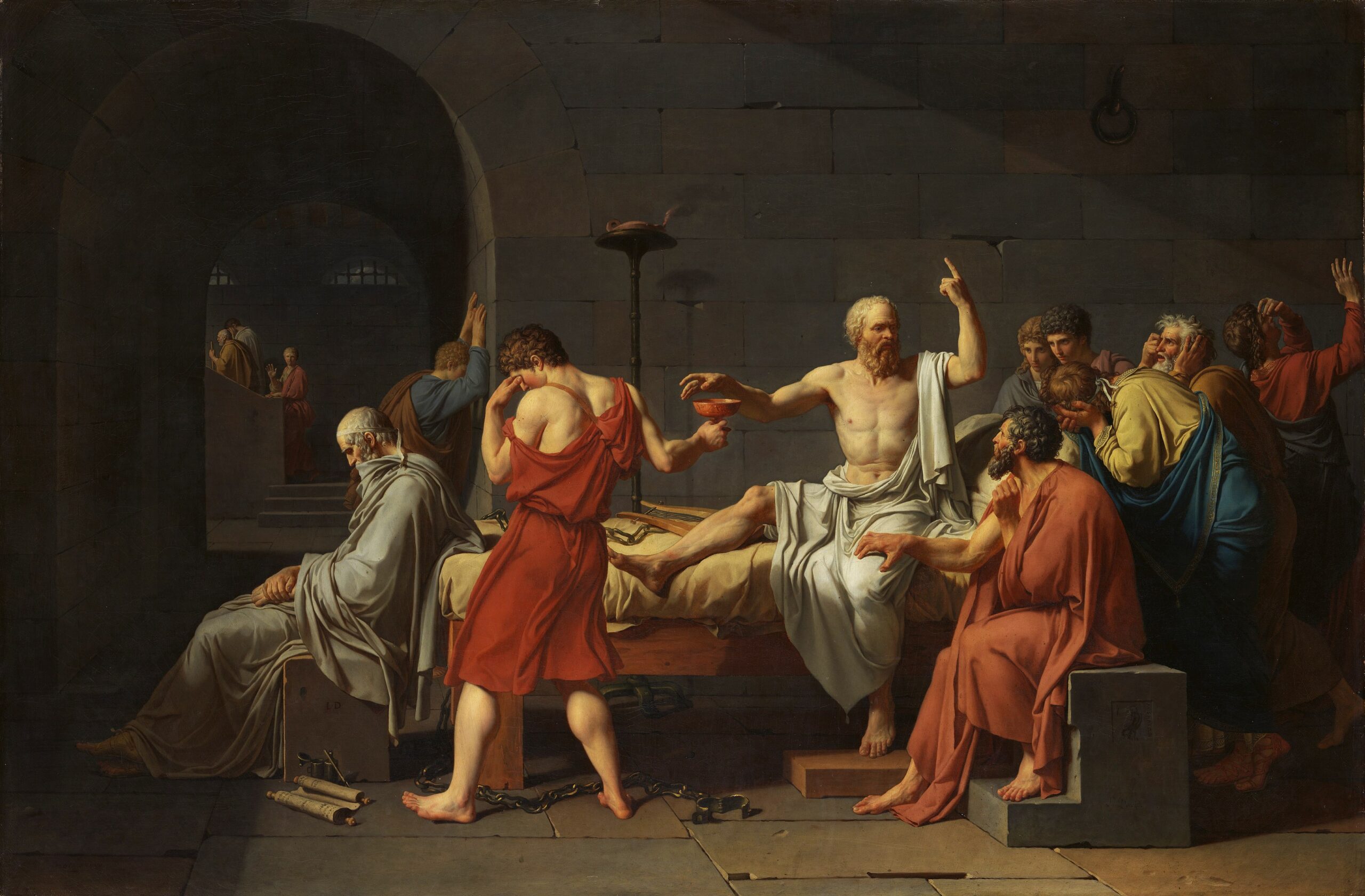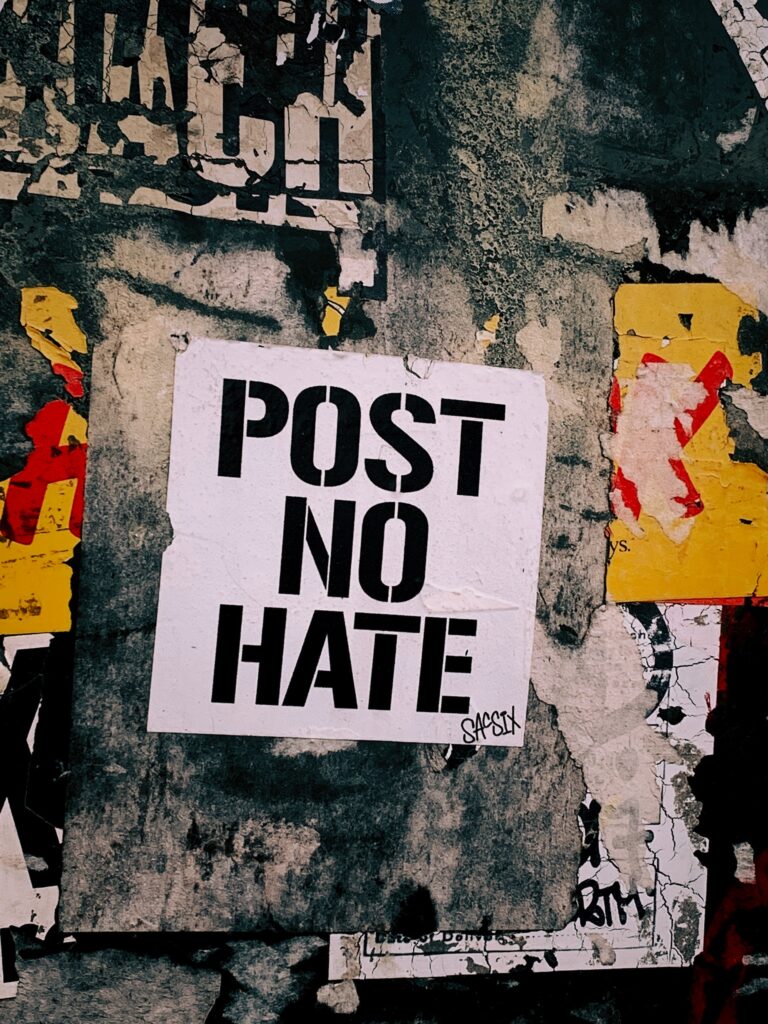If Socrates were to examine the present state of affairs, life, what would he ask the person sitting next to him? The texts of Plato, which describe his personality, indicate he didn’t think much of the state and its group-thinking. He challenged the assumptions and asked people he met to think for themselves, question everything that’s being declared as the truth: true wisdom is in knowing you know nothing. The state as a group was offended by this and sentence him to its harshest punishment of all: death.
He was guilty of asébeia, a crime consisting of not respecting the state´s gods, because, they claimed, he corrupted and demoralized the young and undermined the common morality of the overall society. The sentence, therefore, wasn’t given because there’s no truth, but because he challenged the dominating narrative set forth by the state, that is, the narrative of the group.
The story of Socrates is an apt analogy for many of the things which are going on in today’s world, especially the social media world. Something isn’t right. People no longer think for themselves, instead they are convinced to believe and think what the social media en masse declare as being the truth.
For some time, it has been clear that this is the case, but now more than ever. In the U.S. civil war is a real topic being discussed as people believe one thing on one social media platform, another thing on another. Even different group-thinking is happening on the same platform, depending on which groups or forums the users are following. In Europe we see it in the EU, the divide between Western Europe and Eastern Europe, in our own countries, and even closer to us: in our own families, among our friends, between the youth and our kids. We can’t build up dialogues, instead they immediately turn into discussions with fierce competition.
Socrates wasn’t about a particular political position, as he once said, “[…] a man who really fights for justice must lead a private, not a public, life if he is to survive for even a short time.” Hence, it’s arguable that for Socrates what’s going on today is less a political problem as a cultural one, a human one, or as will become apparent: it’s a technological one.
I
Initially, there was great hope for technology and what it could do for mankind. The tech giants proudly took it upon them to transform human civilization in their own image, one could argue that the high point was the so-called Arab Spring of 2011, where social media played an important role in mobilizing the demonstrators. And it’s still seen today with protests springing up many places around the world, maybe not such much to bring down tyrannies, but more to feed impulses for social change.
Mankind had overcome the problems of communication, they argued. Everyone would get access to Google Translate and similar apps on their smartphones. Everyone would be connected and thus able to increase their sympathies for each other, enhancing mutual understanding. There was, and among many Westerners still is, a belief that technology led to more and more integration between cultures, and in the future cultural barriers would be overcome. But both the Arab Spring and the global community never turned out as many in the West hoped for, especially the tech giants, who got more than they bargained for.
A global civilization can’t be held up, let alone solely by technology, even though it can connect everyone and break down the language barrier in a millisecond. It needs a common framework, such as culture, history, social cohesion, traditions, religion, and, crucially, a naturally spoken and shared language. Only when these elements are intact can a dialogue appear, which is what a civilization must foster in order to increase willingness among its citizens to cooperate with each other, and not just judge each other.
Social media hasn’t been able to produce this common framework simply because it isn’t doable in its current form, another reason is the more commercial, money driven intentions of the companies. In the first decade of our century the explosion of social media on a global scale took a monetizing turn, most notably with the introduction of the Like and Share buttons in 2009, the new currency of the internet. This changed Facebook from being a nonprofitable friend-based service into one of the most profitable and influential social media platforms.
After the introduction of them, and other nastier emojis later in 2017, the algorithms began to learn, and they did it quickly, if it’s learning at all. It’s more like a collection of interactions of “the masses” – thereafter used to feed the users the content they crave for and thus keep them hooked. Through this collection of interactions of the content most likely to be liked or shared, they learn what to promote to the individual but also to other users, outside his or her network, so it can go viral. The Facebook leak by Francess Haugen explains that what was getting promoted, because it best engages users, is hateful and divisive reactions and tweets, videos, and so on. “Anger and hate is the easiest way to grow on Facebook,” she told the British Parliament last year.
The consequence of this development has been countless unhappy lives, especially among the susceptible youth who are engaged in the online inflation of self-promotion to feed the attention economy created by the tech giant, who in turn simply is satisfying shareholders, without protecting society and the citizens living in it. Because of this demand, people working in the tech giants began to cancel those posts and tweets, sometimes the entire person, and often in a biased way, which ended up supporting group-thinking rather than the individual human being.
Socrates would have questioned this. He once explained, as he defended himself against the charges of asébeia, that the problem was not the individual, since he can’t do much to condemn another person, the problem was the group, the many. He said the following words with irony, “happy indeed would be the condition of youth if they had one corrupter only, and all the rest of the world were their improvers,“ as a way to defend himself against the charges of corrupting the young. The responsibility lies on the shoulders of the group.
Or when he powerfully said, “I have said enough in answer to the charge of Meletus: any elaborate defence is unnecessary; but as I was saying before, I certainly have many enemies, and this is what will be my destruction if I am destroyed; of that I am certain; – not Meletus, nor yet Anytus, but the envy and detraction of the world, which has been the death of many good men, and will probably be the death of many more; there is no danger of my being the last of them.”
It would not end with his, and yes, it’s still with us today: the convenience for the group to single out an individual and judge his or her actions. Rather, they are themselves to be judged for the lack of dialogue on social media and the culture at large in our time. All their likes and shares have made the algorithms promote the hatred and division they themselves decry. The group wants to lay the burden at the random individual, the stranger, posting ideas, instead of challenging their own thinking.
A human being in constant fear of being attacked by the group will begin to self-censor, which creates a stifling atmosphere where important ideas that need to be discussed can’t get expressed. People won’t listen to views that are expressed outside the group they agree with as those thoughts aren’t in a safe space, and so they’re triggered. In doing so our society has become stupider, fragile, and less tolerant, because in order to think you need freedom of expression, “only the examined life is worth living.”
Change, therefore, is needed to prevent something dystopian, namely a single viewpoint dominating the moral imagination of the people. This is in no one’s interest. Some people might benefit from it for a short period of time, but in the long run it will break our confidence as a people, as well as our shared sympathies for each other, therefore the responsibility must be placed upon all of us. It is too easy for certain well-off parts of society to declare that the tech companies must do more to censor speech they don’t like, often not even hate speech, simply because it gets liked and shared and thus goes viral. And crucially, without taking responsibility for the situation themselves. After all, they’re the ones who cause it to go viral by interacting with it, without them it would have gone nowhere.
This behavior is also visible in the group’s claims to morality over the individual’s thinking, in social justice and the like. But justice, as Socrates showed, is something an individual does, and for which he or she often must suffer. Justice is hard and requires sacrifice, it’s not about cancelling someone you disagree with on ideological grounds, because their thinking and expression is different from yours. You need to be humble and accept that maybe your own thinking is wrong. Often, it’s about going beyond ideology and politics, just as Socrates did. Real justice means going against the group.
II
The current situation is questionable and unsustainable. Our democracies can’t be held up if there is no real dialogue present among its core institutions, and, more importantly, its citizens. A division which only will increase with time if a solution isn’t found. Solving the problem is far beyond the scope of one article, but here are some suggestions: 1) redesigning the laws that govern the tech giants, and 2) consciously expanding the responsibility from the lone individual onto the shoulders of us all.
Reforming the laws which govern the tech giants is reforming modern life. The reforms, in the words of Center for Humane Technology, must: “Ensure that policies change core business models, forcing tech platforms to internalize the costs of their harms and prioritize human well-being over corporate interests. Doing so will create a better ecosystem to compete in, which will lead to the creation of more humane technology.”
Moreover, social media platforms should be treated as the new public square, as the place in which we meet and share parts of ourselves and learn about the world and our community, and therefore existing regulation, technology, and political behavior must change to allow for freedom of dialogue for all viewpoints. And this requires clearer laws for the companies about what they can do, and what they can’t. For they should be guided by healthy incentives, not just money.
There can also be enacted laws and regulations that ensure more transparency and monitoring. This is especially important when it comes to how the algorithms function and spread content throughout the internet. How are they designed? Are they biased? What kinds of emotions do they focus on? In what way do they do it? Do they take into consideration the consequences of their behavior with regards to mental health? Which methods do they use to promote commercials? How do they monetize the users? Which data of the users are stored? All these questions and many more should be answered and made available to the public, then we need to have an open dialogue about it.
In addition to that, if there is to be a solution, it requires cooperative thinking. Everyone must engage in earnest dialogue with an open mind towards thinking and speaking, and be tolerant to different viewpoints and mistakes. Not stay away from engaging with another human being because he or she has a viewpoint one disagrees with or does not understand. In short, respect human limitations.
This is much closer to what is the real core of the problem: a breakdown in our ability to speak with each other, facilitated greatly by technology, but often also brought about by ideology that politicizes everything and thus divides us. For this problem began in many ways long before the explosion of social media ten years ago, it has been developing for more than a half a century. It’s coming through the school and university system, from those who have graduated from these institutions and now are in the corporate world. When fighting to justify group-thinking over individuals who in fact are no real threat, other than a threat to intolerant thinking and solving the problem.
Hopefully, Socrates was right: “If you think that by killing people you can prevent them from criticizing your misguided lives, you are mistaken.” Nowadays, the sentence to social death can be almost as bad, so let the spirit of Socrates stay alive, let the individual challenge the narrative of the powerful group, even if he or she says something that could be wrong.





